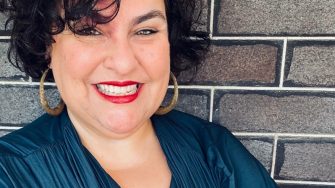Meet the new CCLJ Director: Associate Professor Maria Giannacopoulos
Maria is recognised internationally for pioneering grounded theoretical approaches for understanding law's relationship to colonial power and its expanding carcerality.
Maria is recognised internationally for pioneering grounded theoretical approaches for understanding law's relationship to colonial power and its expanding carcerality.

Maria Giannacopoulos is a Greek-Australian academic in the School of Law, Society & Criminology and the new CCLJ director. Born and raised on Gadigal land, Maria is recognised internationally for pioneering grounded theoretical approaches for understanding law's relationship to colonial power and its expanding carcerality. Prior to joining UNSW Law and Justice, Maria taught law, sociolegal studies and criminology at Flinders University on Kaurna Country for over a decade. Find out more about Maria in this short Q&A:
What project are you working on that excites you?
I am feeling energised by a collaborative and international project on the decriminalisation of abortion. Last year the overturning of Roe v Wade made global headlines. But while intense media and scholarly focus has been on the US, our research team with members based in Sydney, Melbourne, Adelaide, UK and New Zealand, is tracking and seeking to understand the more progressive unfolding global trend towards the liberalisation of abortion. Abortion has been such a central concern for feminists and for gender equality for over 50 years and so we now need to ask: what happens to abortion access after decriminalisation? How effective is decriminalisation as a form of social change?
What do you hope to achieve with your research/impact & engagement in the next year?
I have just stepped into the role of Director for the Centre of Crime Law and Justice. I am excited by this role as it means working closely with CCLJ members to identify key areas of interest and strength as we refresh and sharpen our vision for the next five years. At a time when calls to envision and engage with alternatives to current forms of punishment and policing are being made across the world, CCLJ is perfectly positioned to focus on and collectively respond to some of the most persistent and urgent justice questions. I am keen to build our synergies with individuals, research centres and community organisations with whom we share values, locally, nationally and globally. CCLJ has always been about meaningful engagement with communities and this will continue.
What research/impact & engagement achievement are you most proud of and why?
I am most proud of the fact that my supervision of PhD, Masters and Honours projects over the years has helped to transform the lives of emerging scholars from linguistically, culturally and economically diverse backgrounds. I have supervised students across disciplines (sociolegal studies, criminology, law, gender studies and cultural studies) from Bangladesh, Indonesia, Canada and from Indigenous and CALD Australian backgrounds. It was incredibly heartening to be present at the graduations of two PhD students with refugee backgrounds one of whom had lived in a camp in Africa for over 12 years. Supervision can draw together teaching skill and research expertise in transformative ways. Tina McPhee, who I taught elsewhere, from first year through to Honours while she was on parole, joins us to undertake her PhD in the Faculty this year. I am certain that in supervising Tina, I am contributing to the research strengths of an already formidable voice in criminology.
Do you have a regular research practice that you can share?
I take every opportunity I can to stay in regular contact with academic colleagues around the country and the world for intellectual exchange, mentorship and support in navigating life as an academic from a CALD and working class background. The older I get the more I recognise the necessity for sharing of experiences with others who have navigated the challenges of academic life in similar ways.
Are there any research/impact & engagement questions or problems you need help with? Is there a particular topic you would like to connect with other scholars on?
I am very keen to hear from and connect with colleagues who may be interested in getting involved with CCLJ. I am currently working on my book project Colonial Debtscapes: Austerity Sovereignty Law and would love to buy coffee for anyone interested in chatting about it!